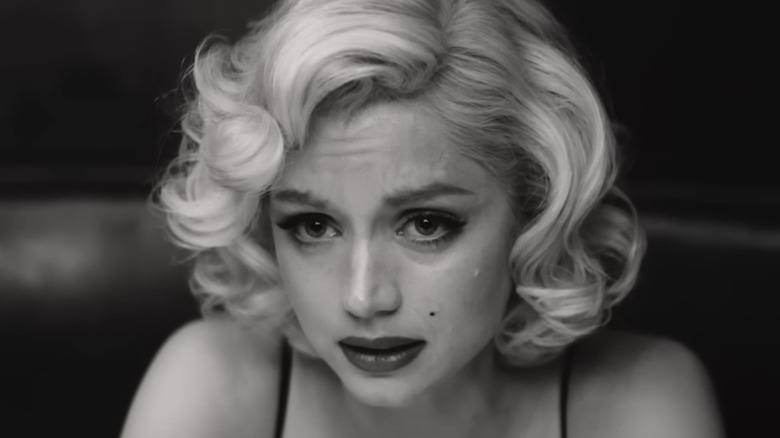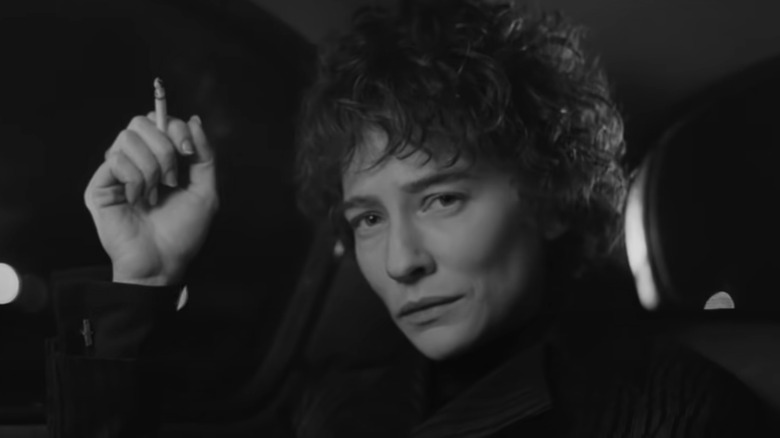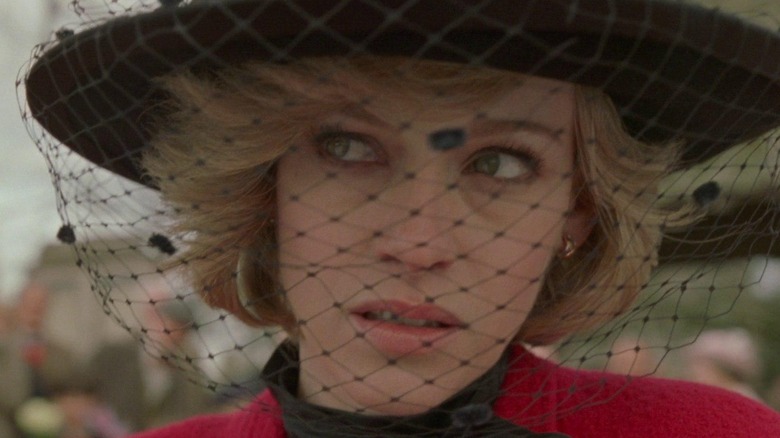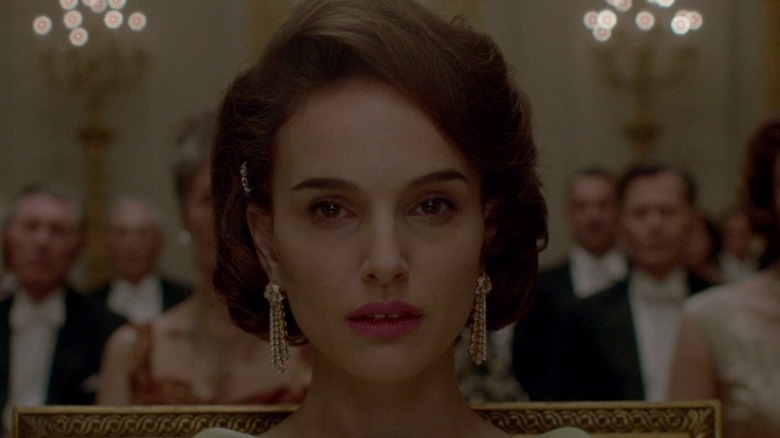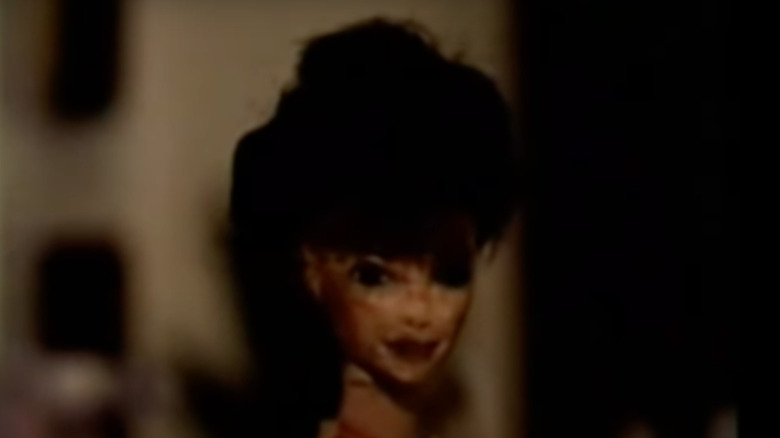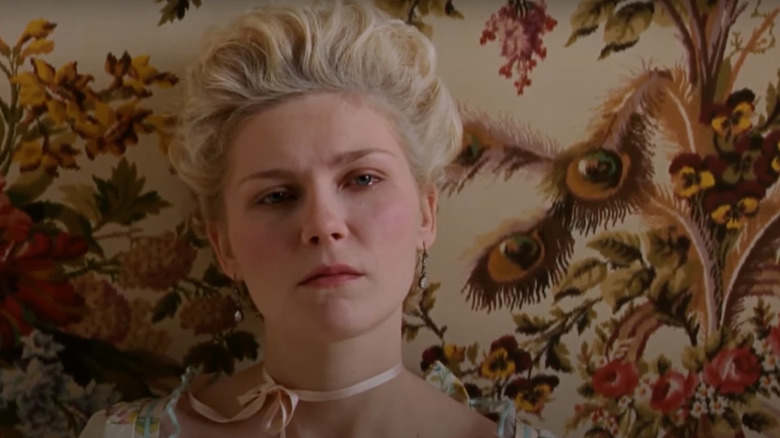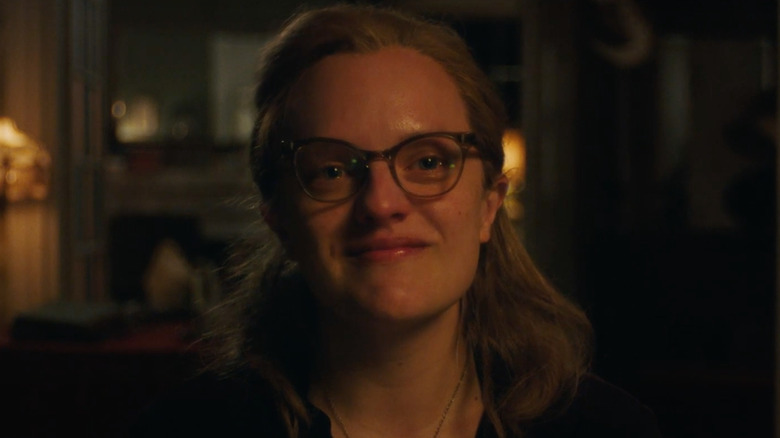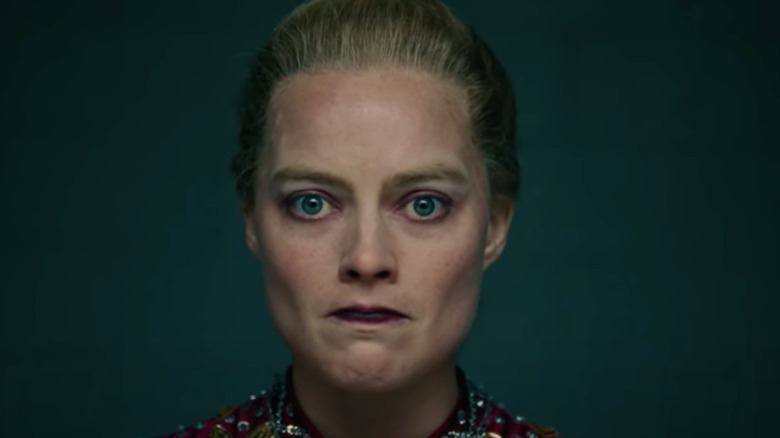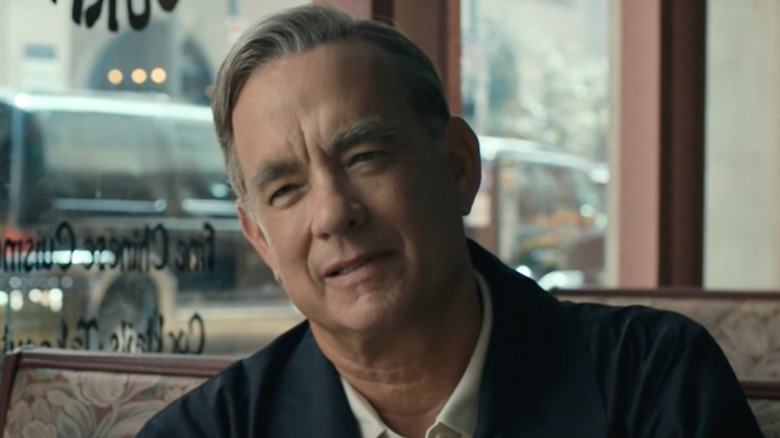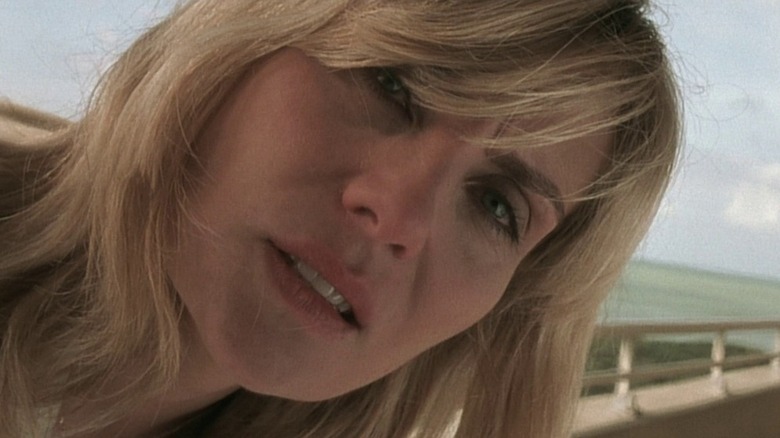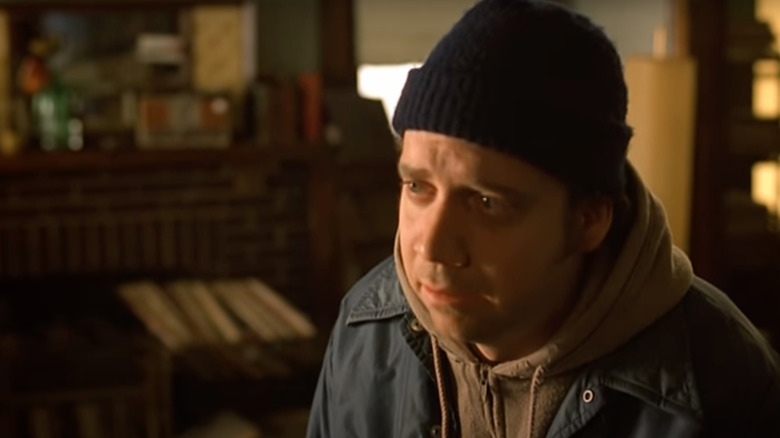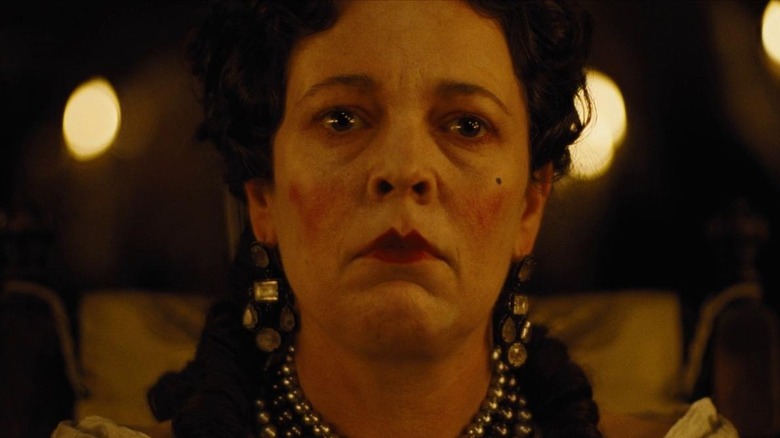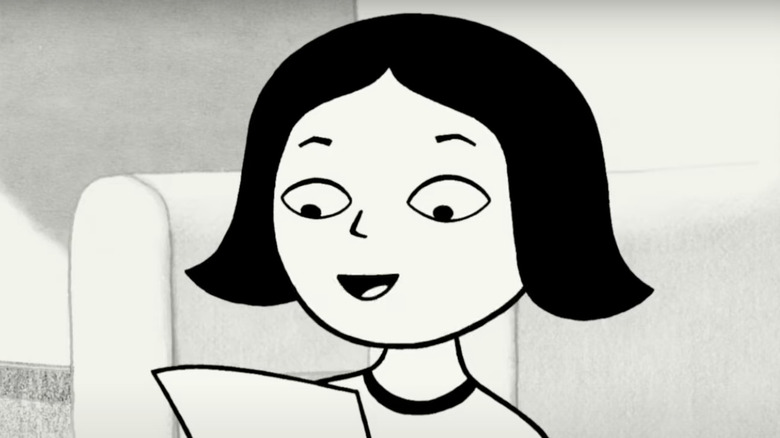12 Great Biopics Like Blonde That Fans Should Check Out
The following article includes references to sexual assault and eating disorders.
"Blonde" is as subversive a biopic as they come. The extent to which writer and director Andrew Dominik corrals the myth of Norma Jean/Marilyn Monroe (Ana de Armas) is dependent upon what the viewer denotes as a successful biopic. "Blonde" is not interested in fan appeasement or celebrating Monroe's iconography. It is a provocative, surrealist art film that investigates the weight of childhood trauma on the performer. Dominik portrays Marilyn's pain and isolation in visually disturbing scenes as she endures misogynistic abuse while forging her acting career, from Howard Hawks' "Gentlemen Prefer Blondes" to Billy Wilder's "Some Like It Hot."
The controversial, NC-17-rated film has received extremely polarizing reactions among critics and audiences alike. But for a biopic, a little controversy is a good thing. Too often they tend to follow formulaic structures that leave you feeling like you have just watched the visualization of a Wikipedia page rather than a compelling film about a prominent figure. Visceral and vague in its dreamy execution, Dominik's film shares more in common with Terrence Malick's "The Tree of Life" or David Lynch's "Inland Empire" than Simon Curtis' popular Michelle Williams-led Marilyn Monroe biopic "My Week with Marilyn." If "Blonde" piqued your interest in biopics, here are 12 more that enlivened the genre.
If you or anyone you know has been a victim of sexual assault, help is available. Visit the Rape, Abuse & Incest National Network website or contact RAINN's National Helpline at 1-800-656-HOPE (4673).
I'm Not There
From "Ray" and "La Vie En Rose" to "Judy" and "Bohemian Rhapsody," most popular music biopics feature a central performances fixated on replicating the given performer's voice or physical appearance. Like Andrew Dominik with Marilyn Monroe, Todd Haynes' Bob Dylan musical fantasia, "I'm Not There" is more interested in capturing Dylan's spirit.
The film cleverly opens with an autopsy being performed on the folk legend, quickly signaling we are not in for a by-the-book account of Dylan's history. In a radical departure from traditional biopic casting conventions, the film brings Dylan's mysterious persona to life with six actors of varying age, gender, and race. Christian Bale, Cate Blanchett, Heath Ledger, Marcus Carl Franklin, Richard Gere, and Ben Wishaw all play Bob Dylan under different aliases, portraying distinct periods of his life and career. The standout is Blanchett, whose Oscar-nominated turn finds her disappearing into her role like a chameleon as she deftly portrays Dylan's confrontational relationship with fame and the press in the mid-1960s. All six storylines harmonize together, culminating in an offbeat but moving portrait of one of our more unknowable musicians. "I'm Not There" is proof that imitation may not be the most sincere form of flattery after all.
Spencer
One of the most frequent stumbling blocks filmmakers encounter while crafting biopics is attempting to cram the entire life of the subject into two hours. A sprawling account of the subject's life through childhood, adolescence, and beyond is not always necessary. Sometimes a rich characterization of someone as complex as Princess Diana can be achieved over the course of three days, as displayed in Pablo Larraín's "Spencer."
Larraín's psychodrama narrows in on Diana's (Oscar nominee Kristen Stewart) contentious 1991 Christmas holiday with the royals at the queen's Norfolk estate. The trip finds Diana in a state of crisis with her marriage to Princess Charles (Jack Farthing) on the rocks and her bulimia constantly triggered by her in-laws and the never-ending parade of food. Larraín uses tight, suffocating framing on Stewart and surrealist imagery (you will not look at pearl necklaces the same) to externalize the storm of anxiety brewing inside Diana. "Spencer" boldly resembles nothing short of a horror movie — with a beguiling ending and ghosts, no less. Similar to Marilyn in "Blonde," some will have difficulty time witnessing a beloved figure like Diana in such pain, but to ignore the darkness in both women's lives would yield an incomplete portrait.
If you are struggling with an eating disorder, or know someone who is, help is available. Visit the National Eating Disorders Association website or contact NEDA's Live Helpline at 1-800-931-2237. You can also receive 24/7 Crisis Support via text (send NEDA to 741-741).
Jackie
Pablo Larraín's second entry on this list is "Jackie," his devastating Jacqueline Kennedy Onassis (Natalie Portman) biopic about the former first lady's emotional aftermath following John F. Kennedy's assassination. The film may be structured around one of the most infamous historical events of the twentieth century, but it is first and foremost an intimate, moody character study. Skirting most biopic traditions, the film opts to almost exclusively focus on the interior landscape of a woman whose life has been completely upended, yet remains determined to keep her emotions hidden from the public.
While Andrew Dominik is quite brutal in portraying Marilyn Monroe's demons, Larrain's treatment of Jackie is more cerebral. He gives Jackie lots of breathing room in between tense scenes coordinating JFK's funeral, simply following her from behind as she roams the halls of the maze-like White House, lost in her thoughts and grief. There are dozens of Jackie O. portrayals in film and on television, and Portman's Oscar-nominated turn will likely not be the last. After seeing her raw performance, though, you will likely think it should be. Portman is a live wire as Jackie and never conceals the uglier and contradictory sides of her trauma as she comes to terms with losing her Camelot.
Superstar: The Karen Carpenter Story
You would be hard-pressed to find a more unusual biopic than Todd Haynes' second entry on this list, "Superstar: The Karen Carpenter Story." The film recounts the meteoric rise to fame and tragic death of Karen Carpenter, lead singer of the beloved 1970s soft pop-rock group The Carpenters. "Superstar" is a peculiar mix of documentary footage, video art, and scripted scenes performed by Barbie dolls. Yes, you read that correctly. Barbies.
Once you adjust to the idiosyncratic casting, "Superstar" transcends its figurative trappings and delivers potent commentary on the artificiality of the mainstream music industry and its impact on Karen's anorexia. What easily could have resulted in a tasteless parody is a genuinely affecting portrayal of Karen's eating disorder years before the topic became a part of the national conversation. Haynes embraces the inherent humor and irony at work here, but never at Karen's disservice. After gaining acclaim and cult following screenings at several film festivals, Karen's brother and band-mate Richard Carpenter sued Haynes for using unlicensed The Carpenters music, and the film was subsequently banned from circulation. The good news for those interested in tracking down the film is that it can now be seen in full on YouTube.
If you are struggling with an eating disorder, or know someone who is, help is available. Visit the National Eating Disorders Association website or contact NEDA's Live Helpline at 1-800-931-2237. You can also receive 24/7 Crisis Support via text (send NEDA to 741-741).
Marie Antoinette
Sofia Coppola was never bound to make a stuffy period biopic. With her third feature film, "Marie Antoinette," the auteur filmmaker boldly toys with the genre's aesthetic conventions. She focuses on Marie's (Kirsten Dunst) arrival to Versailles and her rocky journey to the throne as Queen with candy-colored visuals and a contemporary new-wave rock soundtrack.
Coppola faced ample criticism for leaving the politics of the French Revolution in the background. Instead, she focuses on capturing Marie's life in Versailles as a teenager thrust into a forced, unhappy marriage to Louis XVI (Jason Schwartzman) and suddenly tasked with running France. This intimate perspective gives viewers a closer look at everyday life in Marie's privileged, isolated world and how her youthful exuberance and joie de vivre helped her cope through the darker times. Coppola integrated modern flourishes into her 18th century France with dance scenes at lavish masquerade ball set to a Siouxsie and the Banshees song and a stray pair of Converse sneakers in Marie's wardrobe. Some may find these visual flourishes distracting, but it reminds modern audiences that, despite some dubious political and financial moves, Marie was a teenager in over her head.
Shirley
Some of the best biopics straddle the line between truth and fantasy, like Josephine Decker's "Shirley," the fictional biography of horror novelist Shirley Jackson (Elisabeth Moss). Utilizing her signature impressionist visuals and frenetic camerawork, Decker invites viewers into the mind of agoraphobic Shirley as she endures a spell of writer's block following the wild success of her New Yorker short story "The Lottery." Shirley's writing process is tested when her husband Stanley (Michael Stuhlbarg), a professor at the nearby Bennington College, invites aspiring academic Fred Nemser (Logan Lerman) and his pregnant wife Rose (Odessa Young) to stay with them while Fred guest lectures at the college.
Rose idolizes Shirley and the two form an unusual, co-dependent relationship in which Rose positions herself as Shirley's keeper and muse. She inspires Shirley to begin her next novel about a local missing young woman and helps her conduct research, despite controlling Stanley's incessant interference. Decker's use of the fictional Nemsers and Shirley's writing process as a vehicle to reveal her as a person is an inventive approach rarely seen in biopics. While everything in "Shirley" may not be true, it will surely stoke viewers' interest in Jackson's life and work.
I, Tonya
Craig Gillespie's wickedly entertaining "I, Tonya" begins with a coy warning title card: "Based on irony-free, wildly contradictory, totally true interviews with Tonya Harding and Jeff Gillooly." Right from the jump, it is clear that the story of "I, Tonya" is led by unreliable narrators, which is befitting for a biopic about someone as controversial as disgraced former figure skater Tonya Harding (Margot Robbie).
"I, Tonya" covers an impressive amount of ground in its slick, briskly paced two hours, exploring lesser publicized elements of Tonya's life. The film charts her tumultuous childhood with abusive mother LaVona (Oscar-winner Allison Janney), her dysfunctional marriage with ex-husband Jeff (Sebastian Stan), her ascent to Olympic glory, and how the assault on rival skater Nancy Kerrigan (Caitlin Carver) left her with nothing. As a black comedy about a female athlete, "I, Tonya" is a complete outlier in tone and content within the sports biopic genre, one that brims with saccharine stories about men overcoming obstacles to achieve glory in their respective fields or court. In her Oscar-nominated performance, Robbie plays Tonya with depth and honesty, tapping into her fierce intensity in and out of skates and how the same ruthless ambition that brought her to the Olympics rink led to her undoing.
A Beautiful Day in the Neighborhood
Marielle Heller's heartwarming "A Beautiful Day in the Neighborhood" could be regarded as a fairly standard biopic about Mr. Fred Rogers (Tom Hanks), but it is actually quite unusual in structure. Compared to some of its peers, the film employs an unexpected perspective in its exploration of Rogers, delivering a portrait less of a towering figure and more of an essence. Rogers effectively takes the narrative back seat to a stormy father and son story, following New York City journalist Lloyd Vogel (Matthew Rhys) as he prepares to travel to Pittsburg to profile Rogers for Esquire. Pessimistic Lloyd is wary that the television host's trademark sincerity is nothing but an act for the camera. His time with Rogers has a profound effect on him and inspires him to make amends with his sickly, estranged father Jerry (Chris Cooper) before it is too late.
"A Beautiful Day in the Neighborhood" does not necessarily shed new light on Rogers beyond what Morgan Neville achieved in his documentary "Won't You Be My Neighbor?" but it perfectly encapsulates his influence on everyone he met and will continue to reach in future generations.
The Diving Bell and the Butterfly
Director Julian Schnabel's filmography is almost exclusively biopics about artists, tackling the life of Jean-Michel Basquiat in his debut feature, "Basquiat," to Vincent van Gogh's final years in his last film, "At Eternity's Gate." Schnabel's style is expressive and evocative and he is at the height of his powers with "The Diving Bell and the Butterfly," his biopic about former editor-in-chief of French Elle Jean-Dominique Bauby (Jean-Dominique). When Jean-Dominique suffers a massive stroke, he enters a coma and awakes weeks later to find he has locked-in syndrome, which leaves him mentally alert but physically paralyzed, save for his one eyelid.
Schnabel and cinematographer Janusz Kamiński immerse viewers in Jean-Dominique's perspective by transforming the camera lens into his functioning eyelid. Being physically trapped with Jean-Dominique and his thoughts initially feels oppressive, but the effect becomes mesmerizing and makes the memories he recalls from his life prior to the accident all the more vivid. "The Diving Bell and the Butterfly" is exhilarating and life-affirming, achieving the rare biopic feat of leaving you feeling like you caught a glimpse of its subject's soul.
American Splendor
Husband and wife directing duo Shari Springer Berman and Robert Pulcini's "American Splendor" remains one of the most inventive biopics in recent memory. Utilizing an imaginative blend of scripted scenes, documentary stylized interview footage, and animated storytelling with Harvey's cartoons and comics, the film chronicles the life and work of comic book writer Harvey Pekar (Paul Giamatti) and his wife Joyce Brabner (Hope Davis).
This innovative visual language arms Springer Bermana and Pulcini with the tools to dissect such a complex, multifaceted figure as Pekar. They manage to keep the story true to Pekar's distinctive point of view and cynical wit, never once straying from imbuing scenes with his cantankerous humor. Even as the Oscar-nominated film drifts into darker corners of his life, particularly his lymphoma diagnosis and treatment that would inspire his and Joyce's novel "Our Cancer Year," the film never loses its sardonic edge. "American Splendor" is a testament to the fact that biopics, particularly ones about complicated artists, are sometimes best constructed when the filmmakers are unafraid to scribble outside the lines.
The Favourite
Yorgos Lanthimos' Queen Anne (Oscar winner Olivia Colman) biopic "The Favourite" may be set in 18th century Great Britain, but its acidic, razor-sharp tongue is thoroughly modern. The blisteringly black comedy follows impoverished Abigail Masham (Oscar-nominee Emma Stone) as she arrives at Queen Anne's court seeking employment, which she hopes to procure through the aid of her cousin Sarah Churchill (Oscar-nominee Rachel Weisz), Duchess of Marlborough. Abigail and Sarah strive to attain sway in the court by contending for the attention of gout-stricken Queen Anne, whose depression and poor health have begun to interfere with her royal duties. She has grown far more interested in duck racing and raising her rabbits rather than ruling the country while it is at war with France.
Lanthimos and screenwriters Deborah Davis and Tony McNamara take great liberties with the story's historical accuracy. They gleefully indulge in delicious rumors and gossip about rivalries between Abigail and Sarah and both women's sexual relationships with Queen Anne. The result is a deviously hilarious, vulgar, and ultimately tragic look at how far we will debase ourselves to secure power.
Persepolis
"Persepolis," Marjane Satrapi's adaptation of her autobiographical graphic novels, is a truly singular biopic. Co-written and co-directed by French comic artist Vincent Paronnaud, the film follows 9-year-old Marji (voiced by Chiara Mastroianni) as she comes of age and fights traditions with her mother (voiced by Catherine Deneuve) and father (voiced by Simon Abkarian) during the 1979 Iranian revolution. When the Shah of Iran is driven out of office and Islamic fundamentalists usurp control of the government, Marji and her relatives are forced to live under new strict rules including women being forced to wear headscarves. Marji's parents send her to school in Europe to avoid persecution, sending her on an odyssey of self discovery.
"Persepolis" is gorgeously realized in stark black and white animation, a perfect palette to illustrate Marji's world where she often finds arbitrarily divided into good and bad. As an autobiographical animated memoir, the film is a true rarity in the biopic genre. With rich specificity, emotional and insightful storytelling, and a vivid, frank portrayal of life in wartime, it a completely unforgettable cinematic experience.
